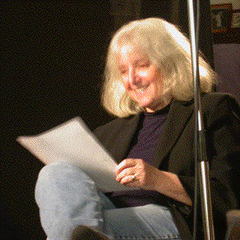Stanislaw Tanchou "....gave the first formula for predicting cancer risk. It was based on grain consumption and was found to accurately calculate cancer rates in major European cities. The more grain consumed, the greater the rate of cancer." Tanchou's paper was delivered to the Paris Medical Society in 1843. He also postulated that cancer would likewise never be found in hunter-gatherer populations. This began a search among the populations of hunter-gatherers known to missionary doctors and explorers. This search continued until WWII when the last wild humans were "civilized" in the Arctic and Australia. No cases of cancer were ever found within these populations, although after they adopted the diet of civilization, it became common."
Simple but incredibly complex
This appeared on the evolutionary listserv this morning, and it struck me as something so simple, so obvious, and probably, so right. It certainly supports my changing my diet, I've tried to eliminate grains before, but failed. Perhaps my failure is because I don't known all the alternative complex carbohydrates to add into a diet eliminating grains, or perhaps adding new complex carbs is too time consuming. Right before reading this, I had been talking to someone on the phone about "urban sprawl" and the environmentally damaging effects of massive numbers of people moving into the suburbs. And right before that phone call, I had been reading a student's dissertation proposal, in which she cites Putman, Bowling Alone. For every ten minutes spent in a car driving to and from work, people experience an increase in the sense of isolation and a decrease in time spent in community activities, with friends or family, all things that contribute to our overall sense of well-being, our "limbic regulation" so to speak. Limbic regulation, that is the positive regulation of our emotion system, can not be achieved by individuals alone. It requires contact between individuals, "regulating" connection with others. We are, throughout our lives, interdependent primates who can't successfully live in isolation.
What connects alone-ness, limbic regulation, diet and cancer?
So what does this have to do with diet and the possibility that consumption of grain products may contribute to our high cancer rates? The connection for me is the way these disparate news items, whether they are true or not, speak to our life-style. We live in our cars, flying over highways, grabbing grain-based snacks on the run, isolated, depressed, dysregulated simply by our degree of isolation. I speak as a psychologist of course, and what I hear everyday from patients along with what I might get from reading--in journals, books and on the Internet-- as well as from research in our lab. My current conclusion is that we are, as a nation of individuals and families, very isolated, and suffering from a sense of loneliness on all fronts. I suspect that this state of isolation affects our brain chemistry in such as way as to set up craving for grains, and whatever shorter term effects they might have on our brain chemistry.
It may come down to serotonin
It may come down to serotonin, although I suspect its more complicated than a single neurotransmitter problem. Over 20 years ago, Raleigh and McGuire conducted experiments demonstrating that when a monkey fails to obtain expected social support, serotonin levels drop dramatically.
Serotonin rises, so I read in another less scientific source I suspect, when one consumes grain products or other complex carbohydrates. People are often warned not to eat a carbohydrate-heavy meal at lunch time, lest they become too sleepy in the afternoon, negatively affecting productivity at work. Eating grains often seems to temporarily reduce anxiety, and to elicit a feeling of relaxation or sleepiness, badly needed by people living without the limbic regulation that can only be provided by another living person. So it may be that serotonin is a major player in our craving grains, and our craving may relate back to failure at systems of social support. Our loneliness then may be a big contributor to the cancer rates in industrialized nations. Loneliness lowers serotonin, putting into motion craving for grains, and consumption of grains, in order to relieve the chemical discomfort resulting from alone-ness, may be associated with the development of cancer.
There are no private solutions
I have always believed "there are no private solutions" to our many social problems; by this I mean, we can't make needed changes by ourselves, they have to be made by everyone in our social group, in our extended social group, in our cities and nations. Without buy in by major corporations and then, by governments, it is simply too difficult to make significant life changes as isolated individuals. We eat what is easily available, and the food product that is always there for snacks, or dinner if we want to call it, is grain products. We suffer from the lack of limbic regulation, because we have to spend long hours at work, and then almost equally long hours transporting ourselves to and from work. Our brain chemistry goes awry and we demand grain products to calm down the nervous system. The corporations manufacturing our food see the demand for grains, and with profit motivation, they produce what we demand, and then they make sure we keep demanding it by way of enticing advertisements that work. The ads grab us, get us emotionally involved in the story being told and ultimately shape what we will demand in the future. Its a vicious cycle when viewed from this perspective.
Are there really no "private solutions?"
I have been questioning my position on "there are no private solutions" dramatically, coming to believe there may be nothing but private solutions and the collective power of private solutions altogether might change our demands, which in turn might change what is produced for consumption. Is the problem really economic and social, we're alone too much because of the organization of work, calling for long hours in the car getting back and forth to work, and long hours at computers in isolated work stations? If we changed the amount we are alone, will we see a rise in serotonin as individuals, followed by a decrease in craving for grains, and ultimately a drop in the cancer rate?
A challenge to myself, following Pavlina's model, the 30 day experiment
Following Steve Pavlina's method of the 30 day experiment, http://www.stevepavlina.com/blog/2005/04/30-days-to-success/ I'm going to try it out on grains. Pavlina's well-read, well-sited blog suggests that one can make desired changes in our habits and our lives if we make the change consciously and consistently for 30 days. Starting today I will go without grain products for 30 days and see what happens. If I bomb out I will try to write about what happened, what triggered a slip into grains If anyone is interested in following this experiment, check back here and perhaps try it with me, just drop a note here and we can commiserate if something happens that might represent our serotonin is dropping too low.


1 comment:
HI Lynn,
I you are definitely on to some things. I don't know if All grains are culprits or not? Then there is the "processing." Some of what I have thought of as grains, like quinoa, are actually seeds. I wonder if they are a problem?
I was talking to a neighbor whose mother has cancer and who compares notes with me sometimes because of my having had cancer. She said she is struggling to get her mother to eat vegan. I reminded her of my vegan cooking class (they do eat brown rice, which I think is a grain). . . then I made some remark about how do we know anything really, it is a crap shot. . . etc. talk, and she said, her sister is an oncologist, which I knew, and that they are seeing incredible results from the vegan diet. Of course that all includes going organic, at least as much as possible. And there is a whole regime for which foods are more important to eat organic and which are not so critical (in general, I hear, the higher up the food chain the more important to get organic as toxins tend to become concentrated). I have failed to eat vegan though some of the time I do. I need more cooking classes to, as you say, learn to combine carbohydrates and seasonings, too. I understand one of the ways beans and other hard to digest carbohydrates become easier to digest is through the use of spices which both taste good and break down the carbs.
Then there is the question of stress, which I sent an email to Joe about that with regard to cancer. I know we've discussed this before, but here is always more. . . Anyway I get all this info from cancer centers and they published an article showing a big link. I will try to find it and forward.
Cancer is such a multifacited problem, I suspect. For one, there is the HRT connection. For another, environmental situations like Love Canal and Hunters Point. Makeup? I don't know. Breast Cancer Action is after the cosmetic companies big time.
You hit on the subject of commuting. The New Yorker had a great article recently. People are driving 6 and 7 hours a day. Though the averages are way less, several hours are hardly sneezed at. I think of 12 step programs as an exception, and I know there are other socially healthier activities, but in general there are no private solutions, I agree.
Loneliness! Nobody is even suppose to pay more than lip service to really hanging out with friends and family. Economics puts us all at odds.
I might try going vegan (the statistics on red meat eating and cancer are pretty impressive) again and then I need to know what the experts are saying about the grain situation. And even what is a grain and what isn't. Good luck with it all to us both.
Pam G.
Post a Comment